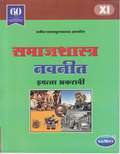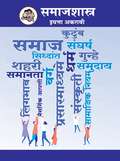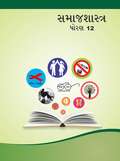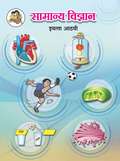- Table View
- List View
Samajsastra class 12 - GSTB Guidebook: સમાજશાસ્ત્ર ધોરણ 12 - જીએસટીબી ગાઈડબુક
by Navneet Education Limitedધોરણ 12 સમાજશાસ્ત્ર વિષયની નવનીત છે.
Samajshastra (Apexit) class 12 - GSTB - Navneet: સમાજશાસ્ત્ર ધોરણ ૧૨ પ્રશ્નસંગ્રહો (માર્ચ, 2020ની બોર્ડ-પરીક્ષા માટે લેટેસ્ટ પેપર-પેટર્ન અનુસાર)
by Navneetધોરણ ૧૨ સમાજશાસ્ત્ર અપેક્ષિત માં વિભાગ A થી વિભાગ E સુધી માં ૨૧ પ્રશ્નસંગ્રહો આપેલ છે, અને ૨ આદર્શ પ્રશ્નપત્ર પણ આપેલ છે.
Samajshastra Digest class 11 - Maharashtra Board Guide: समाजशास्त्र डाइजेस्ट इयत्ता 11वी - महाराष्ट्र बोर्ड मार्गदर्शन
by Shri Navneetसमाजशास्त्र इयत्ता 11वी चे पुस्तक नवनीत एज्युकेशन लिमिटेडने मराठी भाषेमध्ये प्रकाशित केलेले आहे, या मार्गदर्शकाची (१) समाजशास्त्राची ओळख, समाजशास्त्रज्ञांचे योगदान आणि मूलभूत संकल्पना, (२) सामाजिक संस्था, (३) संस्कृती आणि सामाजीकरण, (४) सामाजिक स्तरीकरण आणि सामाजिक परिवर्तन या चार विभागांत विभागणी करण्यात आली आहे. या मार्गदर्शकातील प्रत्येक प्रकरणात सुरुवातीला महत्त्वाच्या मुद्द्यांचे स्पष्टीकरण देण्यात आले आहे. प्रस्तुत मार्गदर्शकात वस्तुनिष्ठ, लघूत्तरी व दीर्घोत्तरी अशा सर्व प्रकारच्या प्रश्नांचा समावेश केलेला असून, त्यांची सुबोध भाषेत मुद्देसूद, समर्पक व आदर्श उत्तरे देण्यात आली आहेत. अभ्यासक्रमात आणि पाठ्यपुस्तकात नव्याने समाविष्ट केलेल्या उपयोजनात्मक प्रश्न व त्या प्रश्नांची समर्पक उत्तरे यांचा प्रत्येक प्रकरणात समावेश करण्यात आला आहे.
Samajshastra Parichay class 11 - NCERT - 23: समाजशास्त्र परिचय ११वीं कक्षा - एनसीईआरटी - २३
by Rashtriy Shaikshik Anusandhan Aur Prashikshan Parishadसमाजशास्त्र परिचय 11वीं कक्षा का राष्ट्रीय शैक्षिक अनुसंधान और प्रशिक्षण परिषद् ने पुस्तक हिंदी भाषा में प्रकाशित किया गया है। यह पाठ्यपुस्तक समाजशास्त्र के परिचय हेतु एक आमंत्रण है। यह समाजशास्त्र विषय का विस्तृत एवं बोझिल वर्णन नहीं है, अपितु यह हमें इसका बोध कराती है और साथ ही समाज को समझने एवं अपनी जिंदगी को बेहतर समझने में समाजशास्त्र किस तरह हमारी मदद करता है, उसका ज्ञान प्रदान करती है। यह पाठ्यपुस्तक विद्यार्थियों को समाजशास्त्रीय दृष्टिकोण, उसकी संकल्पनाओं एवं अनुसंधान के साधनों से परिचित कराती है। यह पाठ्यपुस्तक दर्शाती है कि किस तरह समाजशास्त्र एक विषय की तरह इस तथ्य से संबंधित है कि हममें से प्रत्येक, समाज के सदस्य की तरह, समाज के बारे में सामान्य बौद्धिक विचार और समझ रखता है। समाजशास्त्र ज्ञान के एक निकाय के रुप में सामान्य बौद्धिक ज्ञान के निकाय से कैसे अलग है जोकि समाज में अवश्य पाया जाता है? क्या यह अपनी पद्धति और उपागम के कारण अलग है या यह इसलिए अलग है क्योंकि यह लगातार आलोचनात्मक प्रश्न पूछता है, क्योंकि यह किसी भी विचार को बिना विमर्श के स्वीकार नहीं करता? हम इस तरह के कई और प्रश्न जोड़ सकते हैं। समाजशास्त्र एक ऐसा विषय है जोकि हमें समाज, जिस तरह से कार्य करता है, वह क्यों और कैसे करता है, इसकी समझ देता है और इसके बारे में प्रश्न पूछने के लिए प्रशिक्षण देता है। इसीलिए समाजशास्त्र में प्रयुक्त शब्द एवं संकल्पनाएँ ज़रूरी हैं क्योंकि वही समाजशास्त्रीय समझ के हमारे साधन हैं।
Samajshastra Vishay Ani Drushtikon FYBA Second Semester- RTMNU: समाजशास्त्र: विषय आणि दृष्टिकोन बी.ए. प्रथम वर्ष द्वितीय सेमिस्टर - राष्ट्रसंत तुकडोजी महाराज नागपूर विद्यापीठ
by Dr Pradeep Aglaveराष्ट्रसंत तुकडोजी महाराज नागपूर विद्यापीठाने २०२०-२१ या शैक्षणिक सत्रापासून बी.ए. सत्र-१ आणि बी.ए. सत्र-२ च्या समाजशास्त्र विषयाच्या अभ्यासक्रमात काही बदल केला आहे. या नवीन अभ्यासक्रमानुसार प्रस्तुत पुस्तक लिहिले आहे. हे पुस्तक राष्ट्रसंत तुकडोजी महाराज नागपूर विद्यापीठाच्या बी.ए. सत्र-१ आणि बी.ए. सत्र-२ च्या अभ्यासक्रमानुसार लिहिले असले तरी महाराष्ट्रातील सर्वच विद्यापीठातील ‘समाजशास्त्र' किंवा 'समाजशास्त्र परिचय' या विषयाकरिता उपयुक्त आहे.
Samajshastra class 10 - Karnataka Board: ಸಮಾಜಶಾಸ್ತ್ರ ಹತ್ತನೇ ತರಗತಿ
by Karnataka Patyapustaka Sanghaಇದು ಸಮಾಜಶಾಸ್ತ್ರ ಹತ್ತನೇ ತರಗತಿಯ ಸಮಾಜಶಾಸ್ತ್ರ ಪಠ್ಯಕ್ರಮದ ಪುಸ್ತಕಗನ್ನು ಒಳಗೊಂಡಿದೆ.
Samajshastra class 11 - GSTB: સમાજશાસ્ત્ર વર્ગ 11 - જીએસટીબી
by Gstbઆ પુસ્તક ધોરણ 11 નું સમાજશાસ્ત્ર વિષય નું પાઠ્યપુસ્તક છે .
Samajshastra class 11 - Maharashtra Board: समाजशास्त्र इयत्ता अकरावी - महाराष्ट्र बोर्ड
by Maharashtra Rajya Pathyapustak Nirmiti Va Abhysakram Sanshodhan Mandal Puneसमाजशास्त्र इयत्ता अकरावी हे पुस्तक महाराष्ट्र राज्य पाठ्यपुस्तक निर्मिती व अभ्यासक्रम संशोधन मंडळ, पुणे यांनी लेखन केले आहे तसेच श्री. विवेक उत्तम गोसावी यांनी हे पुस्तक मराठी भाषेमध्ये प्रकाशित केले आहे. पाठ्यपुस्तकामध्ये समाजशास्त्राची ओळख, पाश्चिमात्य आणि भारतीय समाजशास्त्रज्ञांचे योगदान तसेच समाजशास्त्रातील मूलभूत संकल्पना, सामाजिक संस्था, संस्कृती, सामाजीकरण, सामाजिक स्तरीकरण आणि सामाजिक परिवर्तन इत्यादींचा ऊहापोह करण्यात आला आहे. प्रत्येक घटकांअंती, नमुन्यादाखल प्रश्न दिले आहेत आणि संकल्पना चित्रे, स्वअभिव्यक्तीचे प्रश्न, उताऱ्यावरील प्रश्न यांचा समावेश करण्यात आला आहे.
Samajshastracha Parichay Paper 1 FYBA First Semester - SPPU: समाजशास्त्राचा परिचय पेपर १ एफ.वाय.बी.ए. सेमिस्टर १ - सावित्रीबाई फुले पुणे यूनिवर्सिटी
by Dr Jyoti Gagangras Prof. Dr. Sudhir Yevaleसमाजशास्त्र अभ्यास मंडळाने प्रथम वर्षाच्या विद्यार्थ्यांसाठी या अभ्यासक्रमाची निवड करताना खूप कष्ट व काळजी घेतलेली दिसते. मागील अभ्यासक्रमातील कालबाह्य बाबी काढून टाकून समकालीन सामाजिक बदलांचा विचार करूनच या अभ्यासक्रमाची रचना करण्यात आली आहे. सेठ/नेटसारख्या परीक्षा, स्पर्धा परीक्षा व इतर समाजशास्त्र विषय निवडून ज्या काही व्यावसायिक संधी विद्यार्थ्यांना आहेत त्यासाठी त्यांचा प्रवास सुकर व्हावा हाही या अभ्यासक्रमामागील उद्देश आहे. समाजशास्त्रातील वाढत्या संधी, संशोधन, आर्थिक, शिक्षण, कायदा, पत्रकारिता, औद्योगिक, राजकीय, सामाजिक यांतील समकालीन मुद्द्यांना या अभ्यासक्रमात समाविष्ट केले आहे. कुटुंब, नातेसंबंध याचे बदलते स्वरूप अधोरेखित करण्याचा प्रयत्नही झाला आहे. शिक्षक व विद्यार्थी यांना आकलन होईल अशा सोप्या व सरळ भाषेत हा अभ्यासक्रम मांडण्याचा प्रयत्न केला आहे. वापरले जाणारे पर्यायी शब्दही दिले आहेत.
Samajshastracha Parichaya FY. BA. Pune University
by DR Sudhir Yevle. Jyoti S. GagangrasSamajshastracha Parichaya Marathi text book for First year from The Pune Universtity in Marathi.
Samajshastrachi Multatve First Semester FYBA New NEP Syllabus - RTMNU: समाजशास्त्राची मूलतत्वे पहिले सत्र एफ.वाय.बी.ए. नवीन एन.इ.पी. अभ्यासक्रम - राष्ट्रसंत तुकडोजी महाराज नागपूर विद्यापीठ
by Dr Pradeep Agalave Dr Rahul Bhagat"समाजशास्त्राची मूलतत्त्वे" हे पुस्तक समाजशास्त्राच्या विविध पैलूंचे विश्लेषण करते. यात समाजशास्त्राचा उदय, विकास आणि एक विद्याशाखा म्हणून असलेले महत्त्व यावर प्रकाश टाकण्यात आला आहे. लेखकांनी युरोपातील आधुनिकीकरण आणि सामाजिक बदलांच्या संदर्भात समाजशास्त्राच्या विकासाचे स्पष्टीकरण दिले आहे. पुस्तकात, समाजशास्त्र एक विज्ञान म्हणून कसे विकसित झाले, याची माहिती दिली आहे. विज्ञानाची व्याख्या, वैज्ञानिक पद्धती आणि समाजशास्त्रातील तथ्यांचे महत्त्व यावर चर्चा केली आहे. तसेच, सामाजिक स्तरीकरण आणि गतिशीलतेच्या संकल्पनांचे विश्लेषण आहे. समानता, असमानता, विषमता, सामाजिक वर्ग आणि गतिशीलता यांसारख्या घटकांचा अभ्यास यात आहे. आधुनिक समाजातील सामाजिक बदल आणि त्यावर परिणाम करणारे घटक जसे की शिक्षण, विज्ञान आणि तंत्रज्ञान यांचा विस्तृत आढावा लेखकদ্বারা घेतला आहे. हे पुस्तक समाजशास्त्र विषयातील विद्यार्थ्यांना उपयुक्त आहे.
Samajshastrachi Olakh FYBA First Semester - SPPU: समाजशास्त्राची ओळख एफ.वाय.बी.ए. सेमिस्टर १ - सावित्रीबाई फुले पुणे यूनिवर्सिटी
by Dr Vijay M. Jadhavसावित्रीबाई फुले पुणे विद्यापीठाच्या एफ.वाय.बी.ए. या शैक्षणिक वर्षासाठीच्या अभ्यासक्रमात या वर्षापासून सुधारणा करण्यात आली आहे. समाजशास्त्र (समाजशास्त्राची ओळख) या पेपरच्या अभ्यासक्रमात सुचविण्यात आलेल्या सुधारणांची जून २०१९ पासून अंमलबजावणी होत आहे. समाजशास्त्राची ओळख या पुस्तकाच्या सुरूवातीला समाजशास्त्र या विषयाची मूलभूत माहिती, समाजशास्त्रांतर्गत येणारे अभ्यासविषय त्याचप्रमाणे समाजशास्त्राचा उदय, समाजशास्त्रातील विविध क्षेत्रे, समाजशास्त्रातील रोजगारविषयक संधी याबाबत स्पष्टीकरण देण्यात आले आहे. दुसऱ्या प्रकरणात समाज त्याचा अर्थ, व्याख्या, समाजाची वैशिष्ट्ये, समाजाचे स्थल-कालानुसार बदलत गेलेले प्रकार, त्याचप्रमाणे समूह, समूहाची संकल्पना, सामाजिक समूहाची वैशिष्ट्ये, समूहाचे महत्त्व याबाबत माहिती देण्यात आली आहे. तसेच समुदाय आणि सोशल नेटवर्किंग या संकल्पनांची देखील चर्चा प्रस्तुत प्रकरणात केली आहे. पुस्तकाच्या तिसऱ्या प्रकरणात संस्कृती, संस्कृतीचे प्रकार यांची देखील सविस्तर चर्चा करण्यात आलेली आहे. तसेच सामाजिक स्तरीकरण, स्तरीकरणाची वैशिष्ट्ये, स्तरीकरणाचे आधार, सामाजिक अपवर्जन, सामाजिक असमानता यांची देखील विस्तृत आणि तपशीलवार चर्चा प्रस्तुत प्रकरणात करण्यात आली आहे.
Samajshastrachi Olakh First Semester FYBA New NEP Syllabus - SPPU: समाजशास्त्राची ओळख प्रथम सत्र एफ.वाय.बी.ए. नवीन एन.इ.पी. अभ्यासक्रम - सावित्रीबाई फुले पुणे यूनिवर्सिटी
by Dr Jyoti Suhas Gagangrasसावित्रीबाई फुले पुणे विद्यापीठाच्या (SPPU) नवीन राष्ट्रीय शैक्षणिक धोरण (NEP) 2020 अंतर्गत प्रथम वर्ष बी.ए. (FYBA) अभ्यासक्रमात समाजशास्त्राची ओळख हा अभ्यासक्रम समाविष्ट केला आहे. समाजशास्त्र हे मानवी जीवनाच्या विविध पैलूंवर आधारित शास्त्र असून, ते समाज, त्यातील सहजीवन, परस्परसंबंध, वर्तन, आणि सामाजिक प्रक्रियांवर सखोल अभ्यास करते. प्राचीन काळापासून मानवाने सामाजिक जीवनाचा विचार केला असला तरी आधुनिक समाजशास्त्राचा उगम १९व्या शतकात झाला. याचे जनक ऑगस्त कॉम्प्त यांनी समाजाचा अभ्यास शास्त्रीय पद्धतीने करण्याचा पाया घातला. समाजशास्त्र मानवी सहजीवनातील विविध समस्या, सामाजिक संघटनांचा उगम, विकास, आणि त्यामधील विविधतेचे विश्लेषण करते. यामध्ये विविध समाजांची तुलनात्मक पाहणी केली जाते. समाजशास्त्राचा अभ्यास केवळ समाजाच्या स्वरूपावरच नव्हे तर सामाजिक समस्या, आर्थिक विषमता, सांस्कृतिक बदल, आणि तंत्रज्ञानामुळे होणाऱ्या परिणामांवरही केंद्रित असतो. यामुळे समाजाच्या प्रगतीत, नियोजनात आणि धोरणनिर्मितीत समाजशास्त्र महत्त्वाची भूमिका बजावते. सामाजिक नियंत्रण, सामाजिकीकरण, व समाजातील मूल्य-नियमांचे पालन आणि सामाजिक एकात्मतेसाठी आवश्यक तत्त्व यांचाही अभ्यास समाजशास्त्राच्या अंगाने केला जातो. आधुनिक जगात बदलत्या जीवनशैलीमुळे समाजशास्त्र हे शास्त्र समाजाच्या गरजांना अनुरूप राहून नवीन दृष्टिकोन विकसित करत आहे. अशा प्रकारे, समाजशास्त्र हे फक्त शास्त्रीय ज्ञानाचाच विषय नाही तर मानवी समाजाच्या सर्वांगीण विकासासाठी अपरिहार्य ठरते.
Samajshastratil Payabhut Sanklpana Second Semester FYBA New NEP Syllabus - SPPU: समाजशास्त्रातील पायाभूत संकल्पना दुसरे सत्र एफ.वाय.बी.ए. नवीन एन.इ.पी. अभ्यासक्रम - सावित्रीबाई फुले पुणे यूनिवर्सिटी
by Dr Sudhir Ashruba Yewale Prof. Dr. Jyoti Suhas Gagangras"समाजशास्त्रातील पायाभूत संकल्पना" हे पुस्तक मानवी समाज, सामाजिक रचना आणि परस्परसंवाद यांचा अभ्यास करणारे आहे. यात समाजशास्त्राच्या पायाभूत संकल्पनांमध्ये समूह, संस्था, मूल्यव्यवस्था आणि संस्कृती यांचा समावेश आहे. समाजातील व्यक्तीच्या भूमिकांचे, परस्परसंवादांचे व त्यातील बदलांचे स्पष्टीकरण यात दिले आहे. धार्मिक, आर्थिक, राजकीय व शैक्षणिक पैलूंसह समाजातील विविध अंगांची सखोल चिकित्सा पुस्तकामध्ये केली आहे. समाजशास्त्र लोकांच्या वर्तनातील विविध पैलूंना समजून घेण्यासाठी एक मार्गदर्शन करते आणि असमानता, न्याय व समानता यांसारख्या महत्त्वाच्या विषयांवर विशेष भर देते. हे पुस्तक विद्यार्थ्यांना समाजाचा व्यापक दृष्टिकोन देऊन सामाजिक बदल व प्रक्रियेचे महत्त्व समजावून देते.
Samajshastriya Sankalpana Ani Samajik Prakriya FYBA First Semester - RTMNU: समाजशास्त्रीय संकल्पना आणि सामाजिक प्रक्रिया बी.ए. प्रथम सेमिस्टर - राष्ट्रसंत तुकडोजी महाराज नागपूर विद्यापीठ
by Dr Rahul Bhagat Pradeep Aglaveराष्ट्रसंत तुकडोजी महाराज नागपूर विद्यापीठाने 'राष्ट्रीय शैक्षणिक धोरण - २०२०' नुसार सत्र २०२२-२३ पासून बी. ए. प्रथम वर्ष सत्र-१ आणि सत्र-२ च्या समाजशास्त्र विषयाच्या अभ्यासक्रमात आमुलाग्र बदल केलेले आहेत. नवीन शैक्षणिक धोरणानुसार बदललेल्या अभ्यासक्रमावर आधारित 'समाजशास्त्रीय संकल्पना आणि सामाजिक प्रक्रिया' हे पुस्तक विद्यार्थ्यांसाठी तयार करण्यात आले आहे. सदर पुस्तकात नवीन अभ्यासक्रमाचा पूर्णतः समावेश करण्यात आलेला आहे. प्रस्तुत पुस्तक राष्ट्रसंत तुकडोजी महाराज नागपूर विद्यापीठाच्या बी. ए. प्रथम वर्ष सत्र-१ साठी असले तरी महाराष्ट्रातील इतर विद्यापीठातील समाजशास्त्र विषयाच्या विद्यार्थ्यांना व प्राध्यापकांना निश्चितच उपयोगी पडणारे आहे.
Samajshastriya Sankalpana Ani Samajik Prakriya FYBA Second Semester - RTMNU: समाजशास्त्रीय संकल्पना आणि सामाजिक प्रक्रिया बी.ए. प्रथम वर्ष द्वितीय सेमिस्टर - राष्ट्रसंत तुकडोजी महाराज नागपूर विद्यापीठ
by Dr Rahul Bhagat Pradeep Aglaveराष्ट्रसंत तुकडोजी महाराज नागपूर विद्यापीठाने 'राष्ट्रीय शैक्षणिक धोरण - २०२०' नुसार सत्र २०२२-२३ पासून बी. ए. प्रथम वर्ष सत्र-१ आणि सत्र-२ च्या समाजशास्त्र विषयाच्या अभ्यासक्रमात आमुलाग्र बदल केलेले आहेत. नवीन शैक्षणिक धोरणानुसार बदललेल्या अभ्यासक्रमावर आधारित 'समाजशास्त्रीय संकल्पना आणि सामाजिक प्रक्रिया' हे पुस्तक विद्यार्थ्यांसाठी तयार करण्यात आले आहे. सदर पुस्तकात नवीन अभ्यासक्रमाचा पूर्णतः समावेश करण्यात आलेला आहे. प्रस्तुत पुस्तक राष्ट्रसंत तुकडोजी महाराज नागपूर विद्यापीठाच्या बी. ए. प्रथम वर्ष सत्र-२ साठी असले तरी महाराष्ट्रातील इतर विद्यापीठातील समाजशास्त्र विषयाच्या विद्यार्थ्यांना व प्राध्यापकांना निश्चितच उपयोगी पडणारे आहे.
Samajshastriya Sankalpana ani Samajik Prakriya First Semester Ani Second Semester FYBA New NEP Syllabus - RTMNU: समाजशास्त्रीय संकल्पना आणि सामाजिक प्रक्रिया पहिले सत्र आणि दुसरे सत्र एफ.वाय.बी.ए. नवीन एन.इ.पी. अभ्यासक्रम - राष्ट्रसंत तुकडोजी महाराज नागपूर विद्यापीठ
by Dr Pradeep Aglave Dr Rahul Bhagat‘समाजशास्त्रीय संकल्पना आणि सामाजिक प्रक्रिया’ हा ग्रंथ राष्ट्रसंत तुकडोजी महाराज नागपूर विद्यापीठाच्या बी.ए. प्रथम वर्षासाठी तयार करण्यात आलेला असून, राष्ट्रीय शैक्षणिक धोरण २०२० नुसार आधुनिक सामाजिक विचारांची मांडणी करतो. या पुस्तकात संस्कृती, समाज, सामाजिक संरचना, सामाजिक स्तरीकरण, लिंगभेद, सामाजीकरण, सामाजिक परिवर्तन, सामाजिक चळवळी आणि सामाजिक विचलन अशा महत्त्वपूर्ण संकल्पनांचा सखोल अभ्यास करण्यात आला आहे. संस्कृती म्हणजे मानवनिर्मित ज्ञान, मूल्य, विश्वास, संकेत आणि चिन्हांची एक सुसंगत पद्धती आहे, जी समाजाच्या जडणघडणीस आधार देते. सामाजिक संरचनेत समूह, भूमिका, दर्जा, सत्ता, संवाद यांचा समावेश असतो, तर स्तरीकरण म्हणजे समाजातील असमानतेचे विविध प्रकार — जात, वर्ग, लिंग आदींवर आधारित व्यवस्था. लिंगसंबंधी विचारात पितृसत्ताक समाजरचना, लिंगाधारित कामांची विभागणी आणि सामाजिक ओळख या मुद्यांचा विचार केला आहे. पुढील सत्रात सामाजीकरणाची प्रक्रिया, सामाजिक संस्थांचे कार्य, सामाजिक परिवर्तनाची कारणे व स्वरूप (पाश्चात्यीकरण, शहरीकरण, आधुनिकता), तसेच विविध सामाजिक चळवळींचे प्रकार आणि त्यांचे परिणाम यावर चर्चा केली आहे. सामाजिक विचलन आणि नियंत्रण या संकल्पनांतून समाजव्यवस्थेतील नियम, मूल्ये, आणि त्यांच्या अंमलबजावणीच्या पद्धती स्पष्ट होतात. एकूणच, हे पुस्तक विद्यार्थ्यांना समाजशास्त्राच्या मूलभूत संकल्पनांची शास्त्रीय आणि व्यावहारिक समज प्रदान करून सामाजिक वास्तवाचे समजूतदार विश्लेषण करण्यास मदत करते.
Samajshastriya Vicharancha Paya Paper 1 SYBA Third Semester - SPPU: समाजशास्त्रीय विचारांचा पाया पेपर १ एस.वाय.बी.ए. सेमिस्टर ३ - सावित्रीबाई फुले पुणे यूनिवर्सिटी
by Dr Jyoti Suhas Gagangras Dr Sudhir Ashruba Yevaleविविध महाविद्यालयांतील व पुणे विद्यापीठ कार्यक्षेत्रातील ग्रामीण व शहरी भागातील विद्यार्थ्यांसाठी समाजशास्त्रीय विचारांचा पाया हे पुस्तक प्रकाशित केलेले आहे. आजपर्यंत समाजशास्त्रावरील 12 पुस्तके प्रसिद्ध झाली असून 'समाजशास्त्रीय विचारांचा पाया' हे तेरावे पुस्तक आहे. समाजशास्त्राची ओळख व समाजशास्त्राचा परिचय ही पुस्तके तसेच लोकसंख्या आणि समाज हे पुस्तक 2004 पासून बाजारात विक्रीसाठी उपलब्ध आहेत. सावित्रीबाई फुले पुणे विद्यापीठ समाजशास्त्र अभ्यास मंडळ यांनी वेळोवेळी अभ्यासक्रमात बदल केले. त्यानुसार या पुस्तकामध्ये आम्ही लिहिण्याचा व आवश्यक ते बदल करण्याचा प्रयत्न केला आहे. हे सर्व करताना उगाचच शब्दबंबाळ तसेच किचकट व अवघड शब्दांचा वापर टाळण्याचा प्रयत्न केला आहे. जेणेकरून आमच्या विद्यार्थ्यांना हे पुस्तक आकलनास सहज व सोपे वाटावे तसेच या पुस्तकाला विद्यार्थ्यांचा भरीव प्रतिसाद मिळावा, यादृष्टीने पुस्तकाचे लिखाण करण्यात आले आहे.
Samakaleena Bharathada Ithihasa (1947-2010 Ravarege) DSC-12 (NEP Syllabus): ಸಮಕಾಲೀನ ಭಾರತದ ಇತಿಹಾಸ (1947-2010 ರವರಿಗೆ) DSC-12 (NEP ಪಠ್ಯಕ್ರಮ)
by Dr Biligiri N.ಇದು ಹೊಸ ಪಠ್ಯಕ್ರಮದ ಪ್ರಕಾರ ಬೆಂಗಳೂರಿನ ಬಿಎ 6 ನೇ ಸೆಮ್ ಕನ್ನಡ ಮಾಧ್ಯಮ ವಿದ್ಯಾರ್ಥಿಗಳಿಗೆ ಶೈಕ್ಷಣಿಕ ಪಠ್ಯ ಪುಸ್ತಕವಾಗಿದೆ.
Samanya Manasashastra FYBA First Semester - SPPU: सामान्य मानसशास्त्र एफ.वाय.बी.ए. सेमिस्टर १ - सावित्रीबाई फुले पुणे यूनिवर्सिटी
by Prof. Arvind Kakulate Prof. Ramdas Kolekarपुणे विद्यापीठ मानसशास्त्र अभ्यासमंडळाने प्रथम वर्ष कला या वर्गाचा मानसशास्त्र विषयाचा सुधारित अभ्यासक्रम तयार केला आणि हा अभ्यासक्रम जून २०१३ पासून अमंलात आणला. सामान्य मानसशास्त्र या विषयाचा अभ्यासक्रम पुणे विद्यापीठ आणि महाराष्ट्रातील इतर सर्व विद्यापीठांतील सर्व विद्यार्थ्यांना व मानसशास्त्र जाणून (समजवून) घेणाऱ्या वाचकांना उपयुक्त ठरेल हा विचार करून अगदी सोप्या भाषेत दररोजच्या जीवनातील उदाहरणे देऊन आणि आवश्यक त्या ठिकाणी आकृतीच्या मदतीने स्पष्टीकरण दिलेले आहे. हे पुस्तक नामवंत मानसशास्त्रतज्ज्ञ आणि विषयतज्ज्ञ लेखकांच्या ग्रंथांचा आधार घेऊन तयार केलेले आहे. या पुस्तकातील मानवी वर्तनाचे जैविक अधिष्ठान, वेदन-संवेदन आणि अवधान, भावना आणि व्यक्तिमत्त्व या प्रकरणांचे लेखन प्रा. अरविंद काकुळते यांनी केले तर मानसशास्त्र-शास्त्र आणि दृष्टिक्षेप, प्रेरणा, अध्ययन आणि स्मरण, बुद्धी आणि विचार या प्रकरणांचे लेखन प्रा. रामदास कोळेकर यांनी केलेले आहे.
Samanya Vidyan class 8 - Maharashtra Board: सामान्य विज्ञान इयत्ता आठवी - महाराष्ट्र बोर्ड
by Maharashtra Rajya Pathyapustak Nirmiti Va Abhysakram Sanshodhan Mandal Puneसामान्य विज्ञान इयत्ता आठवी हे महाराष्ट्र राज्य पाठ्यपुस्तक निर्मिती व अभ्यासक्रम संशोधन मंडळ, पुणे यांनी या पुस्तकाचे लेखन केले आहे तसेच श्री. विवेक उत्तम गोसावी यांनी हे पुस्तक मराठी भाषेमध्ये प्रकाशित केले आहे. ‘सामान्य विज्ञान’ या पाठ्यपुस्तकाचा मूळ हेतूहा आपल्या दैनंदिन जीवनाशी निगडीत असलेले विज्ञान आणि तंत्रज्ञान ‘समजून घ्या व इतरांना समजवा’ हा आहे. विज्ञानातील संकल्पना, सिद्धांत व तत्त्वे समजून घेत असताना त्यांची व्यवहाराशी असणारी सांगड समजून सांगितले आहे. या पाठ्यपुस्तकातून अभ्यास करताना ‘थोडे आठवा’, ‘सांगा पाहू’ या कृतींचा उपयोग उजळणीसाठी केला आहे. ‘निरीक्षण व चर्चा करा’,‘करून पहा’ अशा अनेक कृतीतून विज्ञान शिकवले आहे. ‘जरा डोके चालवा’, ‘शोध घ्या’, ‘विचार करा’ अशा कृती तुमच्या विचारप्रक्रियेला चालना देतील.
Samanya Vigyan class 6 - Maharashtra Board: सामान्य विज्ञान ६वीं कक्षा - महाराष्ट्र बोर्ड
by Maharashtra Rajya Pathyapustak Nirmiti Va Abhysakram Sanshodhan Mandal Pune"सामान्य विज्ञान" छठी कक्षा की पाठ्यपुस्तक है, जिसमें विज्ञान के मूलभूत सिद्धांतों को सरल भाषा में समझाया गया है। यह पुस्तक प्राकृतिक संसाधनों, सजीव और निर्जीव वस्तुओं, ऊर्जा, बल, गति, प्रकाश, ध्वनि, पर्यावरण, जैव विविधता, तथा ब्रह्मांड से संबंधित विषयों को कवर करती है। इसमें वैज्ञानिक दृष्टिकोण विकसित करने के लिए प्रायोगिक गतिविधियाँ, अवलोकन और विश्लेषण को प्रमुखता दी गई है। पुस्तक का उद्देश्य विद्यार्थियों में विज्ञान के प्रति रुचि जगाना और उन्हें दैनिक जीवन में वैज्ञानिक अवधारणाओं को समझने तथा लागू करने के लिए प्रेरित करना है।
Samanya Vigyan class 6 - Maharashtra Board: सामान्य विज्ञान इयत्ता सहावी - महाराष्ट्र बोर्ड
by Maharashtra Rajya Pathyapustak Nirmiti Va Abhysakram Sanshodhan Mandal Puneसामान्य विज्ञान इयत्ता सहावी हे महाराष्ट्र राज्य पाठ्यपुस्तक निर्मिती व अभ्यासक्रम संशोधन मंडळ, पुणे यांनी या पुस्तकाचे लेखन केले आहे तसेच श्री. विवेक उत्तम गोसावी यांनी हे पुस्तक मराठी भाषेमध्ये प्रकाशित केले आहे. या पाठ्यपुस्तकात सोळा प्रकरण आणि त्याचे स्वाध्याय दिलेले आहेत. या पाठ्यपुस्तकात सामान्य विज्ञान विषयाच्या अपेक्षित क्षमता नमूद केल्या आहेत. या क्षमतांच्या अनुषंगाने पाठ्यपुस्तकातील आशयाची नावीन्यपूर्ण मांडणी करण्यात आली आहे. विद्यार्थ्यांनी निरीक्षण करणे, कृतींच्या आधारे माहिती मिळविणे, माहितीचे संकलन करणे व त्यानुसार वर्गीकरण, अनुमान करणे, निष्कर्ष काढणे इत्यादींवर आधारित कृती, उपक्रम व आशयासाठी पुस्तकात विविध शीर्षकांचा वापर केला आहे. पुस्तकात दिलेली पूरक माहिती विद्यार्थ्यांचे अध्ययन अधिक परिणामकारक करू शकेल.





